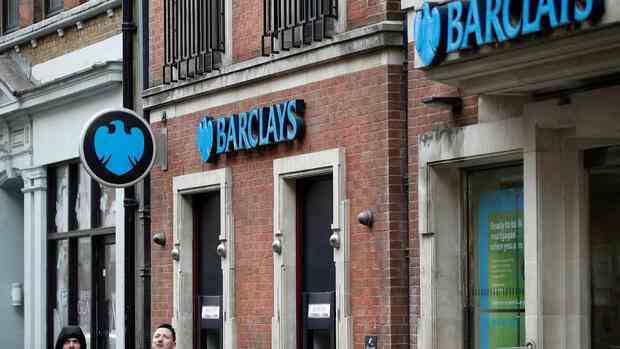In the bond business, the British bank reported better results.
(Photo: Reuters)
London The major British bank Barclays appears to be leaderless in several respects. Not only because their CEO CS Venkatakrishnan has had to work from his sickbed in New York since November because of cancer. Barclays is struggling across all businesses at the moment and so disappointed with its full-year results on Wednesday that analysts questioned the bank’s strategy. By midday, the bank’s share price had fallen by almost ten percent, and in the afternoon the stock was still down almost eight percent at the end of the FTSE 100 index.
“Barclays has sorely disappointed the market with its annual figures,” wrote Sophie Lund-Yates, equity analyst at London investment house Hargreaves Lansdown, in a statement after the presentation of the balance sheet. The bank now has to do some convincing in the short term that it is on the right course.
Barclays’ earnings for both the fourth quarter of 2022 and full-year profit fell short of analysts’ expectations. Before taxes, the British made a profit of around seven billion pounds (almost eight billion euros). In the previous year it had been more than eight billion pounds. In the last three months of the financial year, the profit of 1.3 billion pounds remained below the previous year’s level.
Barclays has plenty of construction sites. The investment bank was unable to offset weakness in its mergers and acquisitions (M&A) business with strong trading profits. Worse still, the bank’s dealmakers and dealers delivered a series of glitches last year. A mistake in trading structured finance products in the US alone cost the bank more than £750m in penalties and damages.
Barclays had to set aside another $200 million because employees in the US illegally used encrypted messaging services to exchange commercial information. In Great Britain, the financial regulator FCA is investigating whether the Barclays bankers have not taken it too seriously with the rules against money laundering. The bottom line is that the breaches of the rules cost the bank around £1.6 billion. A further £1.2bn has been set aside for possible loan defaults as a result of the economic crisis. The bank expects a significant increase in non-performing loans.
CEO Venkatakrishnan admitted that the result had suffered primarily from the breakdowns in the USA. “I am determined that such incidents will not be allowed to happen again,” the manager wrote in a prepared statement. The Indian-American took over the helm at Barclays in November 2021 from Jes Staley, who resigned after a dispute with the financial regulator. Barclays has a long history of rule-breaking dating back to the 2012 Libor scandal
>> Read also: Scottish Prime Minister Nicola Sturgeon announces her resignation
However, the mistakes have consequences: Barclays reduced the pot from which its bankers get their bonuses by eight percent to £1.8 billion. The top management with Venkatakrishnan and CFO Anna Cross also had to accept wage cuts. Cross justified the moderate reduction in the bonus pool by saying that the bank was “really satisfied” with its overall performance.
This assessment is likely to surprise analysts and investors not only because of the problems in investment banking already described. Barclays also underperformed market expectations in traditional banking. The Bank of England’s steady hikes in key interest rates have caused the interest margin – the difference between interest income and interest expenses – to rise sharply.
Analysts are dissatisfied with the interest rate business
Barclays’ net interest margin (NIM) rose nine points to 3.1 percent in the final quarter of 2022, driving related interest income up 30 percent. For the current year, however, Barclays is still expecting a slight increase in the margin to 3.2 percent. That’s not ambitious enough for many analysts.
One more reason why Barclays shares, unlike those of domestic competitors Natwest and Lloyds, have not benefited from the boom on the British stock market. On the contrary: Barclays has recorded the lowest price increase of all stocks listed in the FTSE 100 stock market index since the beginning of the year.
In a bid to appease investors, the major British bank has announced a £500m share buyback for the first quarter of the new financial year. But even that wasn’t enough for the analysts. “In our opinion, the buyback is not good enough,” wrote Joseph Dickerson of the investment house Jefferies Financial Group, referring to the significantly higher distributions of European competitors. For comparison: the French BNP Paribas is making its shareholders happy with a share buyback of up to five billion euros. At Unicredit it is 3.3 billion euros.
The strong market reaction to the disappointing results should revive the discussion whether Barclays, with its two mainstays in investment banking and retail banking, is in the right place. Especially if Natwest and Lloyds should soon exceed market expectations with good interest income. But even a similarly positioned bank like BNP Paribas has fared significantly better in investment banking than Barclays.
More: Conversions in various places: Warren Buffett rearranges his portfolio


